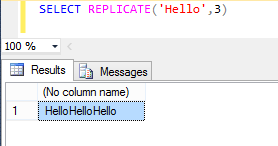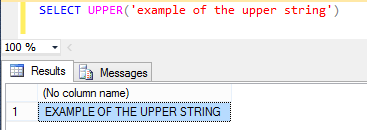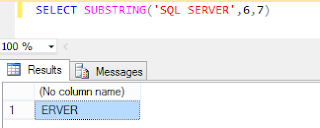String Functions Used In Sql Server
1. ASCII(Expression)
Returns the ASCII code value of a expression
Arguments
|
Data type
|
Description
|
Return
|
Expression
|
Char or Varchar
|
Fixed-length non-Unicode character data with length of n bytes
|
Integer
|
Example:
Arguments
|
Data type
|
Description
|
Return
|
Integer_Expression
|
Tinyint
|
The integer_expression should be from 0 to 255. If the value of integer
is above 255, NULL is returned
|
Char(1)
|
Example:
Searches an expression and returns the starting position of the specified expression in character string
Arguments
|
Data Type
|
Description
|
Return
|
Search_Expression
|
Varchar
|
Is the
string expression to be searched
|
Integer or Bigint
|
Expression_to_be_search
|
Varchar
|
The string or number or an
alphanumeric value to search within.
|
|
Start_location
|
Bigint
|
Optional, At which position search will start. The first position is
1
|
Example:
Soundex converts an alphanumeric string to a four-character code based on how the string sounds when spoken.
The first character of the string are converted into Upper case and through second character are converted into three numbers based on Soundex guide. Zeros are added at the end if necessary to produce a four-character code. Additional letters are disregarded
Soundex Coding Guide
Number Represents the letters
Disregard the letters A,E,I,O,U,H,W and Y
Example:
Number Represents the letters
Number
|
Represents
the letters
|
1.
|
B,F,P,V
|
2.
|
C,G,J,K,Q,S,X,Z
|
3.
|
D,T
|
4.
|
L
|
5.
|
M,N
|
6.
|
R
|
Disregard the letters A,E,I,O,U,H,W and Y
Arguments
|
Data type
|
Description
|
Return
|
Expression
|
Varchar
|
Fixed-length non-Unicode character data with length of n bytes
|
Varchar
|
Example:
To compare 2 character strings and returns the difference between the soundex values of specified strings. Difference can return from 0 to 4. 0 means little or no similarity and 4 means strong similarity or identical values.
Arguments
|
Data Type
|
Description
|
Return
|
Expression1
|
Varchar
|
Fixed-length non-Unicode character
data with length of n bytes
|
Integer
|
Expression2
|
Varchar
|
Fixed-length non-Unicode character
data with length of n bytes
|
Example:

6. LEFT(Expression,Number_Of_Characters)
Returns the specified number of characters from the left hand side of the given character expression.
Arguments
|
Data Type
|
Description
|
Return
|
Expression
|
Varchar or nVarchar
|
Fixed-length non-Unicode character
data with length of n bytes
|
Varchar or nVarchar
|
Number_Of_Characters
|
Integer
|
Specifies how many characters of the string
to extract and return
|
Example:

7. RIGHT(Expression,Number_Of_Characters)
Returns the specified number of characters from the right hand side of the given character expression.
Returns the specified number of characters from the right hand side of the given character expression.
Arguments
|
Data Type
|
Description
|
Return
|
Expression
|
Varchar or nVarchar
|
Fixed-length non-Unicode character
data with length of n bytes
|
Varchar or nVarchar
|
Number_Of_Characters
|
Integer
|
Specifies how many characters of the string
to extract and return
|
Example:
8. LEN(Expression)
Returns the length of the specified string. The length is returned excluding any trailing blank characters.
Arguments
|
Data type
|
Description
|
Return
|
Expression
|
Varchar or nVarchar
|
Fixed-length non-Unicode character data with length of n bytes
|
Integer or BigInt
|
Example:
Converts a character of the string to lower case.
Arguments
|
Data type
|
Description
|
Return
|
Expression
|
Varchar or nVarchar
|
Fixed-length non-Unicode character data with length of n bytes
|
Varchar or nVarchar
|
Example:
Converts a character of the string to upper case.
Arguments
|
Data type
|
Description
|
Return
|
Expression
|
Varchar or nVarchar
|
Fixed-length non-Unicode character data with length of n bytes
|
Varchar or nVarchar
|
Example:
Removes blanks at the left hand side of the given character expression
Arguments
|
Data type
|
Description
|
Return
|
Expression
|
Varchar or nVarchar
|
Fixed-length non-Unicode character data with length of n bytes
|
Varchar or nVarchar
|
Example:
Removes blanks at the right hand side of the given character expression
Arguments
|
Data type
|
Description
|
Return
|
Expression
|
Varchar or nVarchar
|
Fixed-length non-Unicode character data with length of n bytes
|
Varchar or nVarchar
|
Example:
Arguments
|
Data type
|
Description
|
Return
|
Expression
|
Integer
|
A positive whole number from 0 through 65535
|
nChar(1)
|
Example:

14. PATINDEX(Search_pattern_literal,Expression_to_search)
Returns the starting position of the first occurrence of a pattern in a specified expression. It takes two arguments, the pattern to be searched and the expression. PATINDEX() is similar to CHARINDEX() where in CHARINDEX() we cannot use wildcards, whereas PATINDEX() provides this capability. If the specified pattern is not found, PATINDEX() returns ZERO
Arguments
|
Data Type
|
Description
|
Return
|
Search_pattern_literal
|
Varchar or nVarchar
|
Is the string expression to be searched |
Integer or Bigint
|
Expression_to_be_search
|
Varchar or nVarchar
|
The string or number or an
alphanumeric value to search within.
|
Example:
It accepts a string as input and returns string of a valid delimited identifier according to defined pattern.
Arguments
|
Data Type
|
Description
|
Return
|
Expression
|
nVarchar(128)
|
Fixed-length non-Unicode character
data with length of n bytes
|
Varchar or nVarchar(258)
|
Quote_character
|
Char(1)
|
Optional, one character string to use
as the delimiter
|
Replaces all occurrence of a specified string value with another string value.
Arguments
|
Data Type
|
Description
|
Return
|
Expression_to_be_search
|
Varchar or nVarchar
|
The string or number or an
alphanumeric value to search within.
|
Varchar or nVarchar
|
Search_Expression
|
Varchar or nVarchar
|
Is the string expression to be
searched
|
|
Replacement_Expression
|
Varchar or nVarchar
|
Is the replacement string
|
Example:
17. REPLICATE(String_To_Be_Replicate,No_Of_Times_To_Be_Replicate)
Repeats the given string for the specified no. of times
Arguments
|
Data Type
|
Description
|
Return
|
String_to_be_Replicate
|
Varchar or nVarchar
|
Is a string to be repeat
|
Varchar or nVarchar
|
No_of_times_to_be_replicate
|
Bigint
|
Is the number of times the string to
be repeated
|
Example:

18. REVERSE(EXPRESSION)
String function returns the string in reverse order.
Arguments
|
Data type
|
Description
|
Return
|
Expression
|
Varchar or nVarchar
|
Fixed-length non-Unicode character data with length of n bytes
|
Varchar or nVarchar
|
Example:

19. SPACE(EXPRESSION)
Returns no. of spaces, specified by the no. of spaces argument
Arguments
|
Data type
|
Description
|
Return
|
Expression
|
Integer
|
The number of spaces to be returned
|
Char
|
Example:

20. STR(Float_Expression,[Optional] Length,[Optional] Scale)
Returns character data converted from numeric data
Arguments
|
Data Type
|
Description
|
Return
|
Float_Expression
|
Float
|
Is an expression of approximate Float
data type
|
Varchar
|
Length
|
Int
|
Optional, Default value of length is
10. If you specify negative value then it returns NULL. It should be greater
than or equal to the part of the number before the decimal point plus the
number’s sign. If it is not so then it returns **
|
|
Scale
|
Int
|
Optional, The number of decimal places in the resulting string and cannot
exceed 16. If decimal_places is not specified, it will default to 0
|
Example:

21. STUFF(Original_expression,Startposition,Number_of_characters,Replacement_expression)
Inserts replacement expression at the start position specified along with removing the characters specified using length parameters.
Arguments
|
Data Type
|
Description
|
Return
|
Original_expression
|
Varchar, nVarchar or Varbinary
|
Fixed-length non-Unicode character
data with length of n bytes
|
Varchar, nVarchar or Varbinary
|
Start_position
|
Bigint
|
Is an integer value that specifies the
location to start insertion or deletion
|
|
Number_of_characters
|
Bigint
|
Is an integer that specifies the
number of characters to delete
|
|
Replacement_expression
|
Varchar, nVarchar or Varbinary
|
This expression will replace length characters
of replacement_expression beginning at start.
|
Example:

22. SUBSTRING(Expression,Start_Position,Length)
Returns substring (part of the string) from the given expression
Arguments
|
Data Type
|
Description
|
Return
|
Expression
|
Varchar, nVarchar, Text, nText,
Varbinary, Image
|
Is charaacter ,binary, text, ntext, or image expression
|
Varchar, nVarchar, Text, nText, Varbinary, Image
|
Starting_position
|
Bigint
|
specifies where the returned
characters start
|
|
Length
|
Bigint
|
specifies how many characters of
the expression will be returned
|
23. UNICODE(Expression)
Returns the integer value, as defined by the Unicode standard for the first character of the input
Arguments
|
Data type
|
Description
|
Return
|
Expression
|
Varchar or nVarchar
|
Fixed-length non-Unicode character data with length of n bytes
|
Integer
|
Example:















its very helpfull...thanks for sharing :)
ReplyDeleteThanx..
DeleteVery nicely written and very informative. For a network admin like me, sql is a must if you consider the future market and hence article like yours will be very helpful. Thanks alot dear author for such an amazing article. Keep up the good work..!!
ReplyDeletethanks...
DeleteNice.. It's very helpful ����
ReplyDeleteVery very helpful, please continue writing in future. Thanks a lot
ReplyDelete